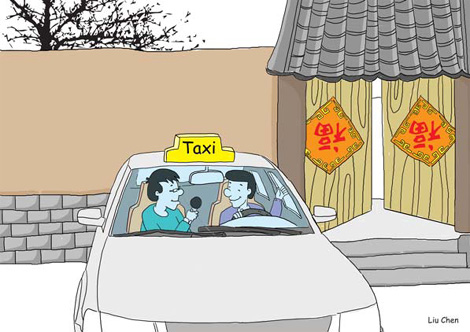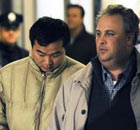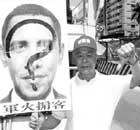Comment
A Beijing cabbie's perspective
By Wang Ru (China Daily)
Updated: 2010-01-14 09:13
 |
Large Medium Small |

On a freezing evening last week, I hailed a cab instead of squeezing myself onto a bus crowded with white-collar workers.
The cabbie asked my destination first - the cabs that gathered in the Central Business District in the evening only take passengers to the east, since many of the cabbies live in the villages in east suburb of Beijing and prefer to pick up passengers on their way home.
After giving him the information he wanted, I jumped into his car.
"You know, you shouldn't refuse to take passengers," I said. He took a glimpse at me in the rearview mirror.
"Maybe you are right. But it is the best choice for us. Who wouldn't want to take a customer on their way home instead of burning gasoline for nothing?" he said.
The cab inevitably became stuck in the traffic jam. As we trundled forward like a snail, I had a long chat with my driver.
He lives in a village near the East Sixth Ring Road. The 35-year-old man has driven a cab for 15 years and has a 12-year-old son in middle school.
"Can you imagine that there are 4 million cars in Beijing?" he said, adding that 100 households in Beijing own 66 cars on average.
"If it wasn't for the limitation system, the traffic would get even worse," I said.
"But I don't think it is clever to limit the cars," he said, which surprised me a lot. "Car owners don't get discounts for buying cars, so why do they have to quit driving for one day every week?"
It seems that this cabbie aggress with Daniel McFadden, the economist who won the 2000 Nobel Prize and questioned the car limitation policy in Beijing.
"I earn about 3,000 yuan a month and I am satisfied with this income," he said. "I can't afford a home in the city, but my life is not bad out of town."
"I hold a rural hukou and get an annual subsidy from the government for the occupation of my arable land. I live in my own house and don't owe a single penny to the bank," he said.
"The village head sold our arable land to a real-estate developer at 50 million yuan last year," he said, "But none of us know how the money was spent."
"Is your income enough for your family?" I asked after learning that his son needs about 10,000 yuan every year for tuition fees to study in an urban school.
"I have an extra income," he smiled. He told me that all the villagers built extended houses beside their courtyards and rented them out. He can earn about 20,000 yuan a year.
"I won't push my son to go to university. Actually, I think it is much better to master a practical skill. Don't you know how hard it is for college students to find jobs these days?" he asked.
"Life is simple for us. We buy vegetables and meat from market and rarely purchase expensive goods we don't need," he said.
"I don't understand why so many young people are pouring into the city. Are they happy? I know those housing developers must be," he said with a smile.
When I got out of his car on that snowy night, I saw crowded buses and trains taking exhausted white-collars workers back to their apartments - mostly paid for through bank loans with excessive levels of interest.
So who has a better life - a cabbie or a white-collar worker? While I can't say for sure, I do at least know that sometimes we should stop and think a little about our lives in this city.










